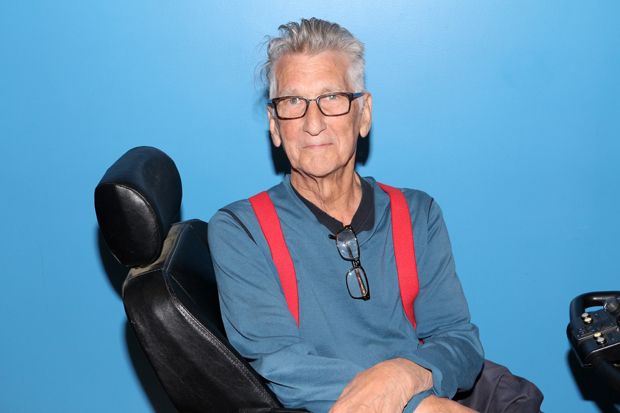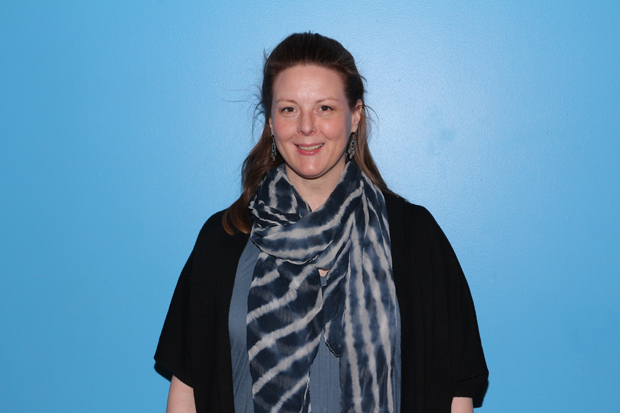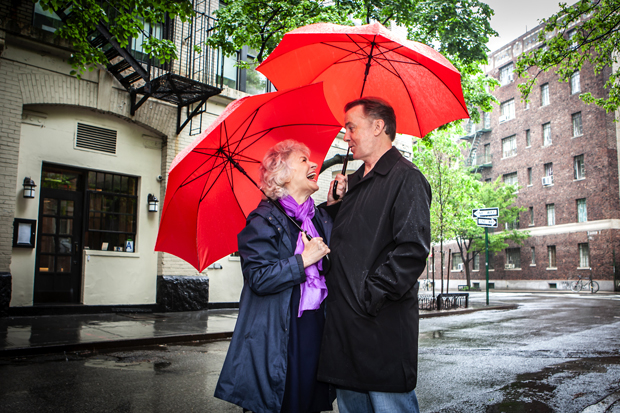Charles Mee on Finding First Love in Your 70s

(© David Gordon)
When it comes to theatrical representations of first love, most people instantly think about Shakespeare's Romeo and Juliet: two teenagers fall head over heels at first sight. But is such a love possible in your 70s? First Love playwright Charles Mee thinks so. "I have found it now, finally," says Mee, who turns 80 this year. "I've been married for 15 years, so we're living happily ever after."
Two years before that third marriage, First Love received its debut at New York Theatre Workshop in a one-month run that coincided with the immediate aftermath of the September 11 terrorist attacks. Mee speculates that the relative inaccessibility of lower Manhattan prevented audiences from finding the play. But New Yorkers now have another chance to discover this uncommon romantic comedy in a new production at the Cherry Lane Theatre, directed by Kim Weild.

(© David Gordon)
The play is about septuagenarians Edith and Harold, who meet on a park bench one day and spark a connection over their leftist politics. It's a spark that quickly transforms into a fiery romance. Mee explains, "This play was inspired by a Beckett short story called 'First Love.' Most stories about first love are about young people who fall in love, but the Beckett story was about a couple of older people. I thought that was great. You never know when you're going to find your first love."
Weild echoes that sentiment: "If you haven't met the love of your life, they might be sitting right next to you," she says, advising, "Allow yourself to stay open to others." Weild insists that such openness is essential not just in love, but in art. "My brother, who is deaf, really taught me the art of listening. That is a big component of directing," she notes. "If you can stay open and listen there's hope and possibility for anything."
Mee, who offers all of his scripts on his website and invites theater makers to "pillage" them in pursuit of new work, has also endeavored to maintain an extraordinary level of openness in his art. "My hero in life is Picasso," he says, elaborating, "He had a Blue period, Rose period, and he did collage; but he never thought of his work in terms of 'periods.' He did whatever he wanted to do. That's what I've tried to do in the theater." He is currently working on a piece with "extreme action" choreographer Elizabeth Streb, sure to be a departure from First Love, which is mostly two people talking.
For Weild, who has directed four previous Mee plays, "First Love also feels like a departure. Her first professional production of Mee's work was Fêtes de la Nuit, which earned a 2010 Unique Theatrical Experience Drama Desk nomination, in part for Weild's spectacularly colorful staging. There are elements of that high theatricality in her production of First Love'', but Weild describes it as "a different beast in an exciting way."
Weild feels that the play has challenged her to work differently than she typically has as a director. "I have had tremendous luck of having two fantastic actors who have been willing to make the leap with me," she comments about the show's stars, Michael O' Keefe and Angelina Fiordellisi. She admits, "There are things I've asked them to do that are very different than what they're used to."

(© Monique Carboni)
The enthusiasm to learn and adapt may be the greatest asset, both as an artist and a romantic partner. "My parents have been together over 65 years," Weild says, adding, "My father has said, 'On the one hand I know your mother very well. On the other, I feel like every day I'm learning something new.' "
It also means learning to admit when you're wrong, something Mee has discovered relatively recently: "Back in the day of my first marriage, I was an alcoholic and a drug addict. Then in my second marriage, although I had stopped drinking and doing drugs, I was still a crazy person," he says, acknowledging, "The fact that our marriages didn't work out was entirely my fault."
So is there hope for Harold and Edith, two complex and flawed individuals in their twilight years? Audiences are sure to have conflicting opinions, which Weild explains is by design: "In a lot of plays, we think we know the characters by the end. What Chuck does is present characters that we think we know at first glance. Then, as the play unfolds, we discover the largeness of their humanity. We arrive at this place of potentially not knowing who they are." We may never fully know another human being, and all people change over time. Anticipating that change and accepting a partner's complexity could be the keys to turning a first love into a lifelong romance.










